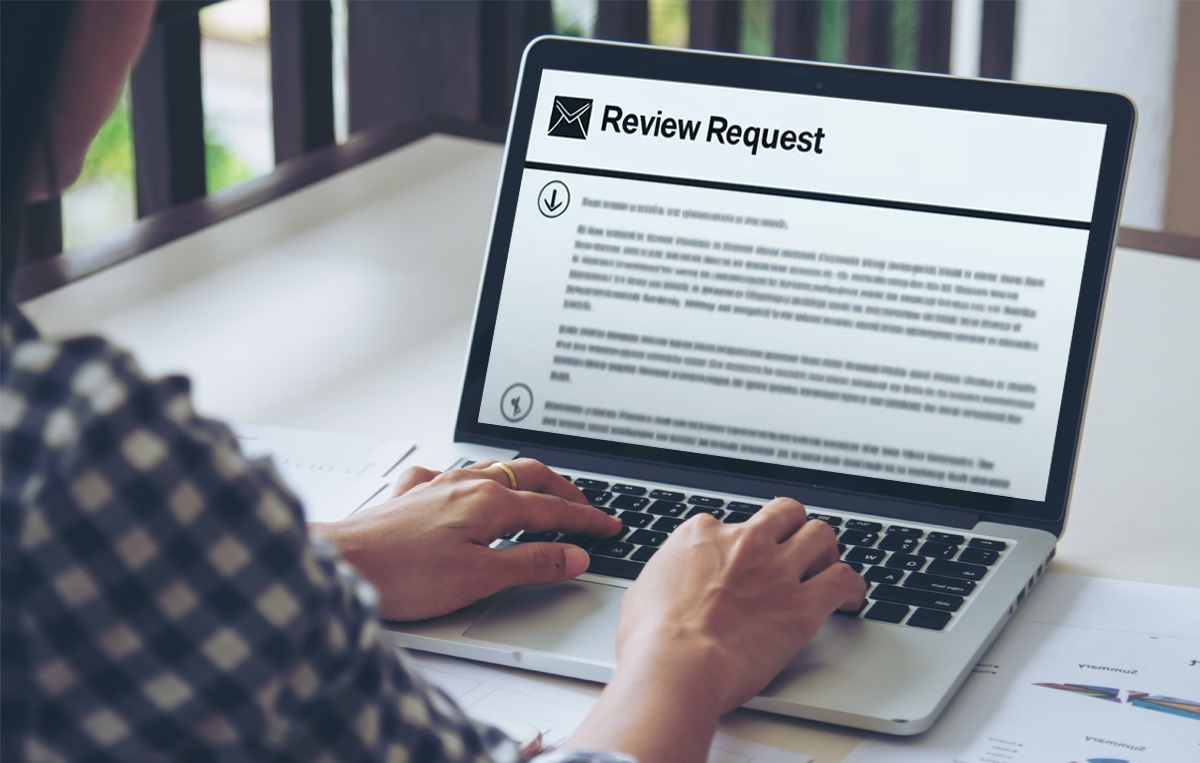People often check existing customer reviews on Yelp and Google Reviews before trying new products and services, specifically from local businesses.
Both platforms are incredible and inform prospective customers a lot about any business. But which one should you use to enhance your business presence: Yelp or Google reviews?
This blog will thoroughly explore the various aspects of both Yelp and Google reviews to guide you on how to utilize both of these platforms effectively. Let’s dive in!
Yelp Vs. Google Reviews: A Quick Glance at the Key Differences
Google Reviews and Yelp are distinct platforms, each with its unique features. Before diving into an in-depth analysis of both, let’s first highlight the key differences between Google Reviews and Yelp.
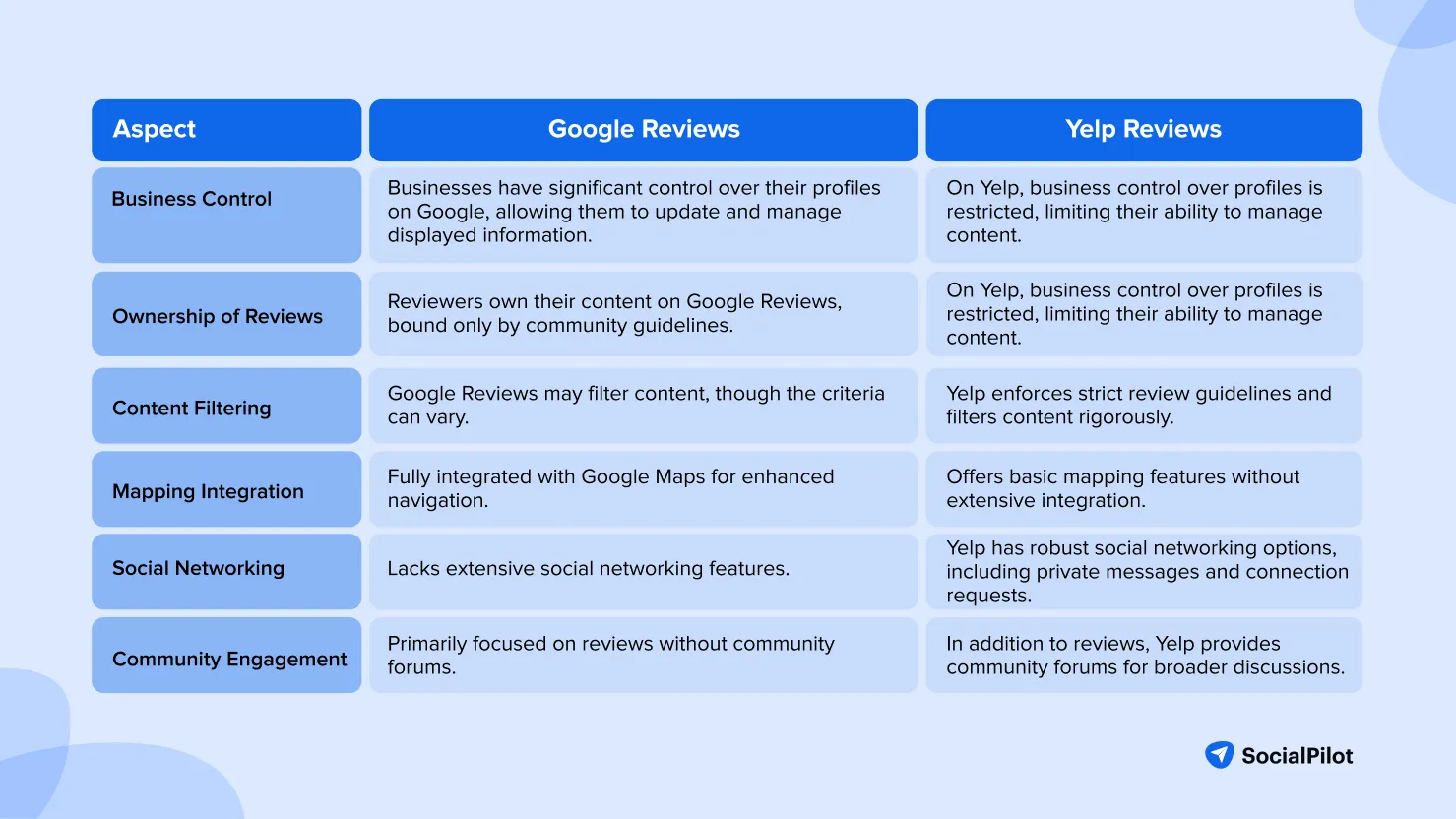
Understanding Yelp Review
To better understand if Yelp is the right fit for your business, you need to know how it works and its key advantages and disadvantages. Let’s start by getting to know Yelp better.
What is Yelp?
Yelp is a very popular online business listing and review directory platform that hosts user-generated reviews about local businesses of all shapes and sizes. The main objective of Yelp is to assist customers in making better and more informed buying decisions by showing the reviews left behind by other community members.
As a business, you can also utilize Yelp to your advantage by listing your products and services on Yelp and connecting with potential and existing customers.
For instance, on the Yelp dashboard, you can see a list of restaurants for customers to compare based on star ratings and reviews, along with business information such as address, amenities, and more.
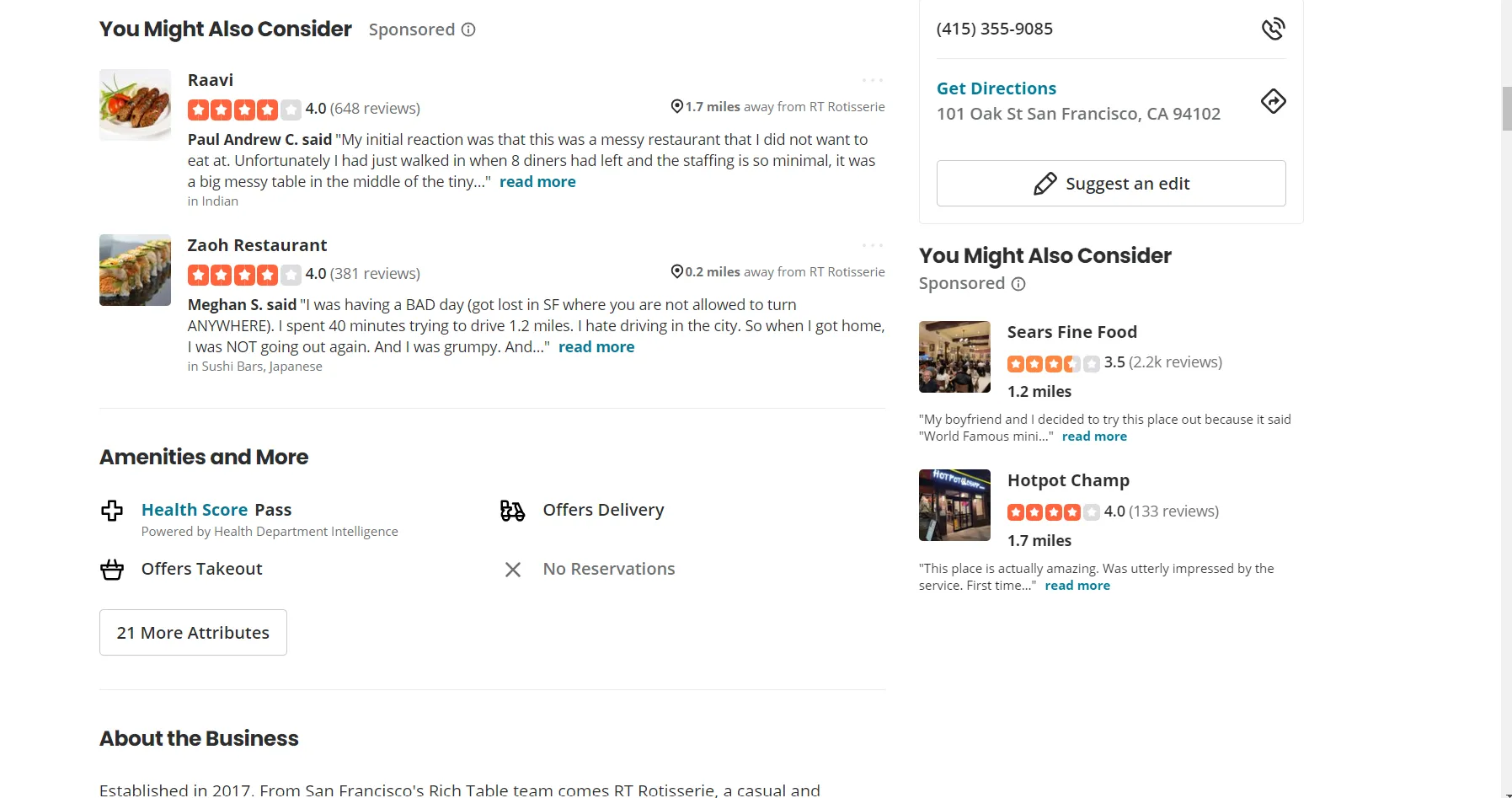
How Does Yelp Work?
Using Yelp is simple. Let us see how it works:
1. Search Functionality
Potential customers who are in a decision-making phase can search for businesses by entering search keywords related to the type of business or service they’re looking for, along with their location.
As seen in the image below, users can search for cafes, restaurants, plumbers, and more in their location and compare multiple reviews of different businesses that the platform recommends.
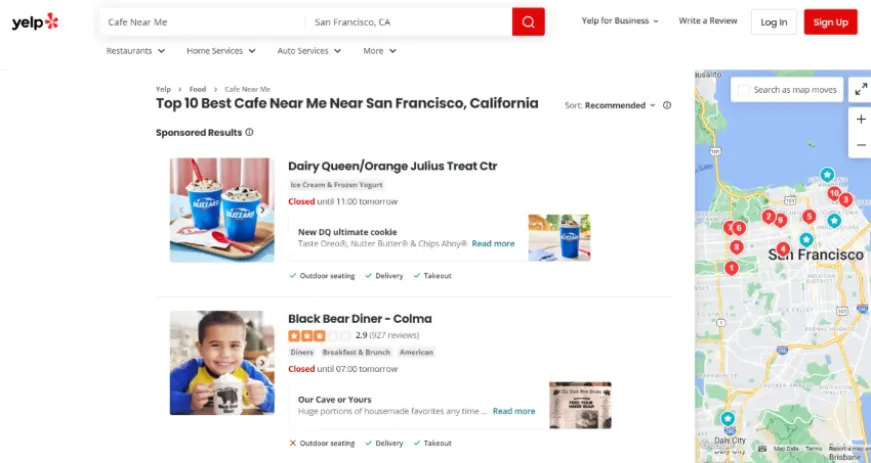
2. Listings and Filters
Yelp shows a list of businesses matching the search criteria of the customers, which they can further refine using filters such as distance, price range, and categories. Using these filters, users can quickly find what they need.
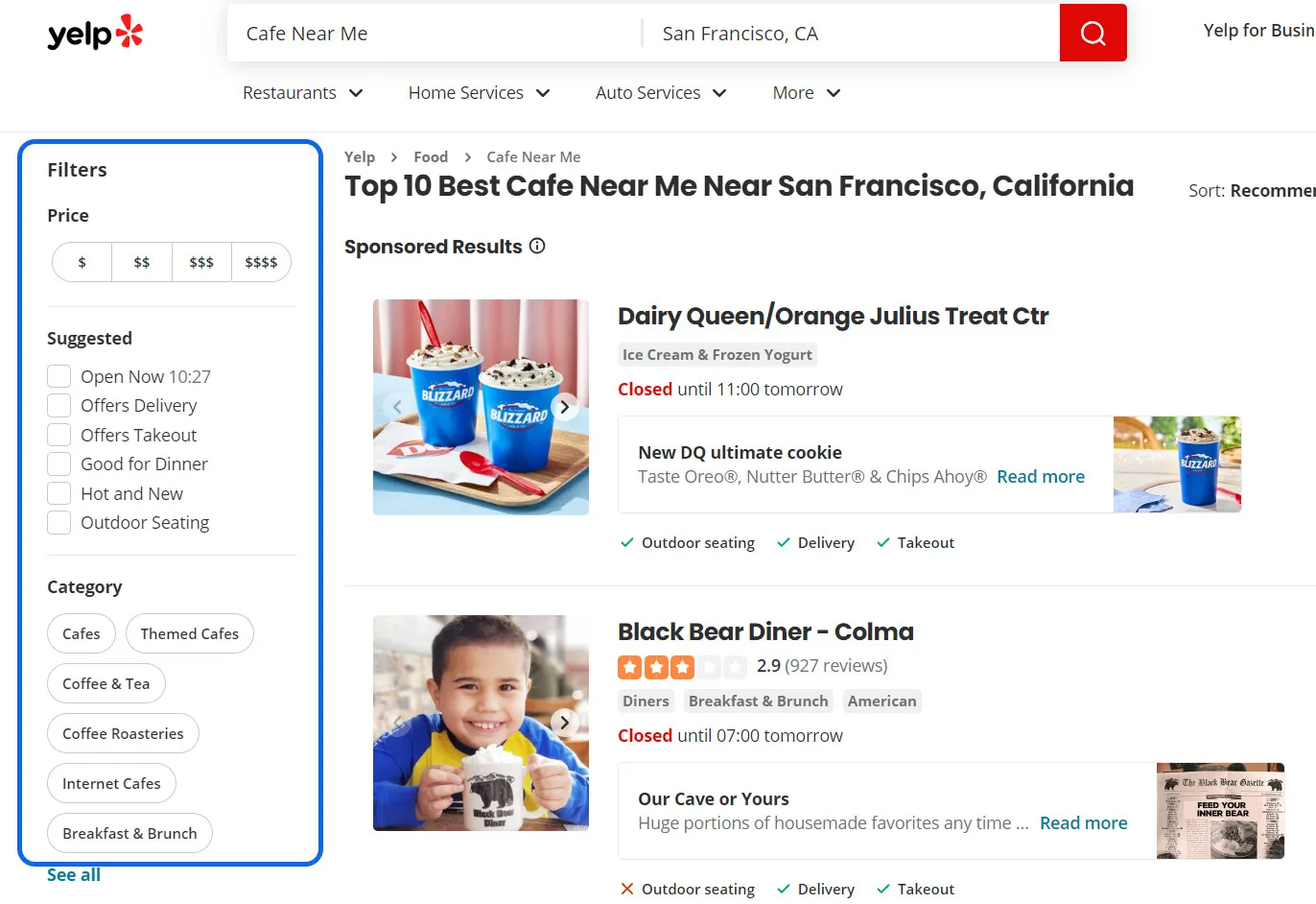
3. Business Details
Clicking on a listing gives users more information about the business, such as address, contact details, operating hours, and user-generated photos.
For instance, take a look at the image below—you’ll see what Yelp shows when you look for a restaurant. It provides details such as menu, location, and reviews. This kind of information helps customers make informed decisions about where to eat. Yelp makes it simpler to get an idea of what the restaurant offers before a customer chooses to go there.
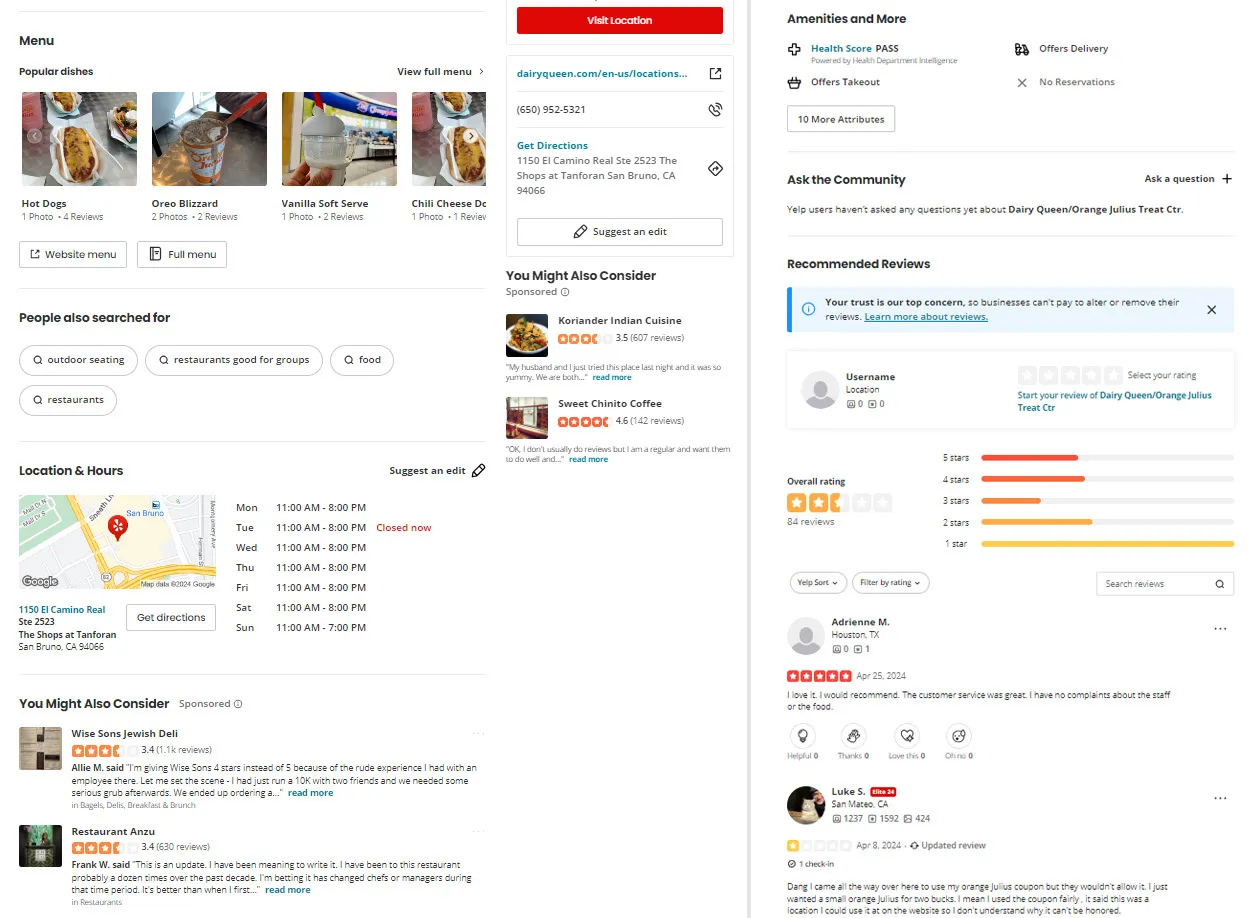
4. Reviews and Ratings
Users with a Yelp account can leave detailed reviews and also leave star ratings (between 1 and 5 stars). They can also interact with reviews shared by others by liking, sharing, commenting on them, and labeling them as “useful,” “funny,” or “cool.”
To get a clearer understanding, take a look at the screenshot below. It shows what Yelp’s ratings and reviews section looks like.
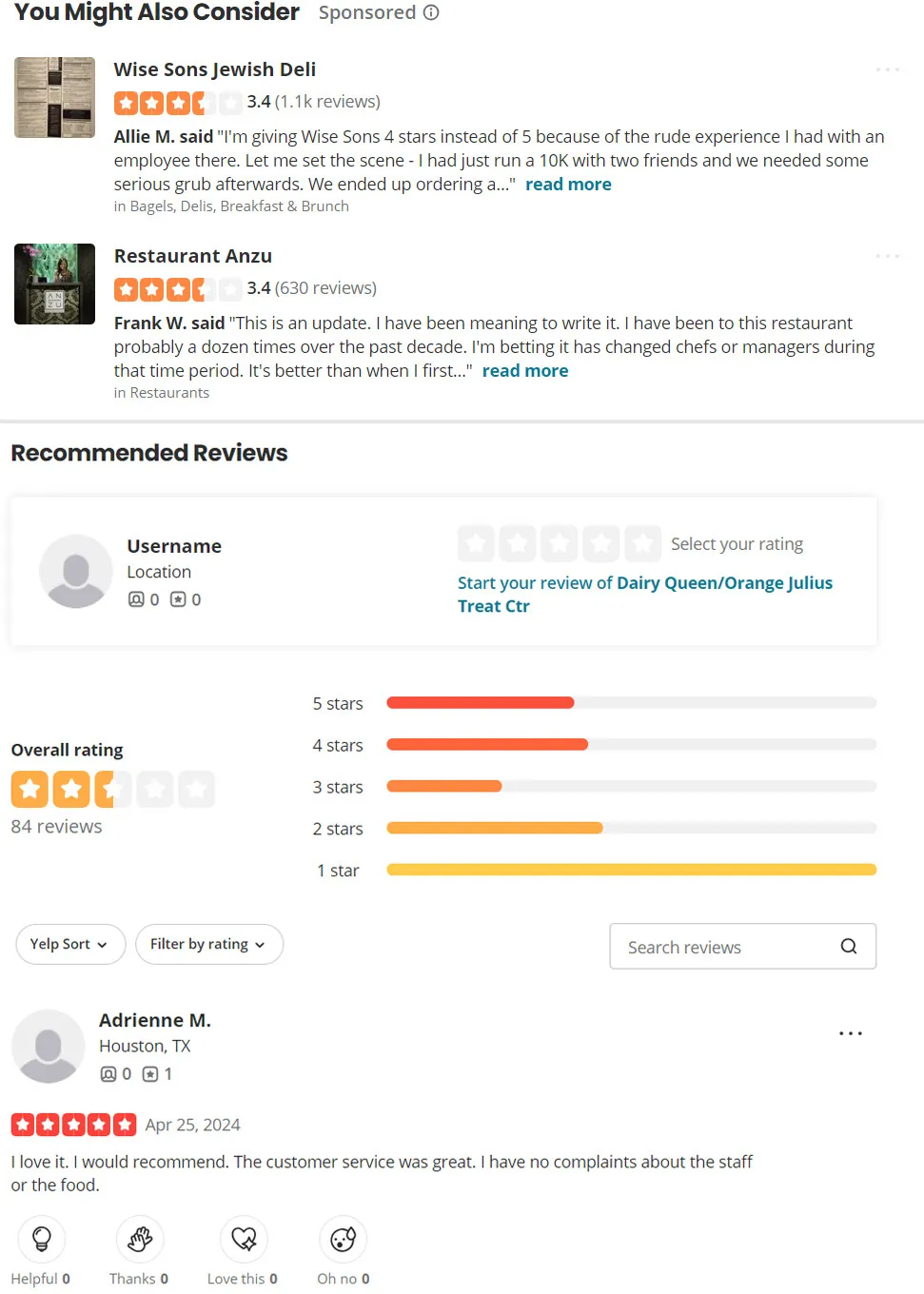
5. Interaction
Users can bookmark businesses, follow them for updates and notifications about special offers or events, and message them directly through Yelp.
Look at the save button in the below image. Users can simply click on the button to bookmark the business of their choice.
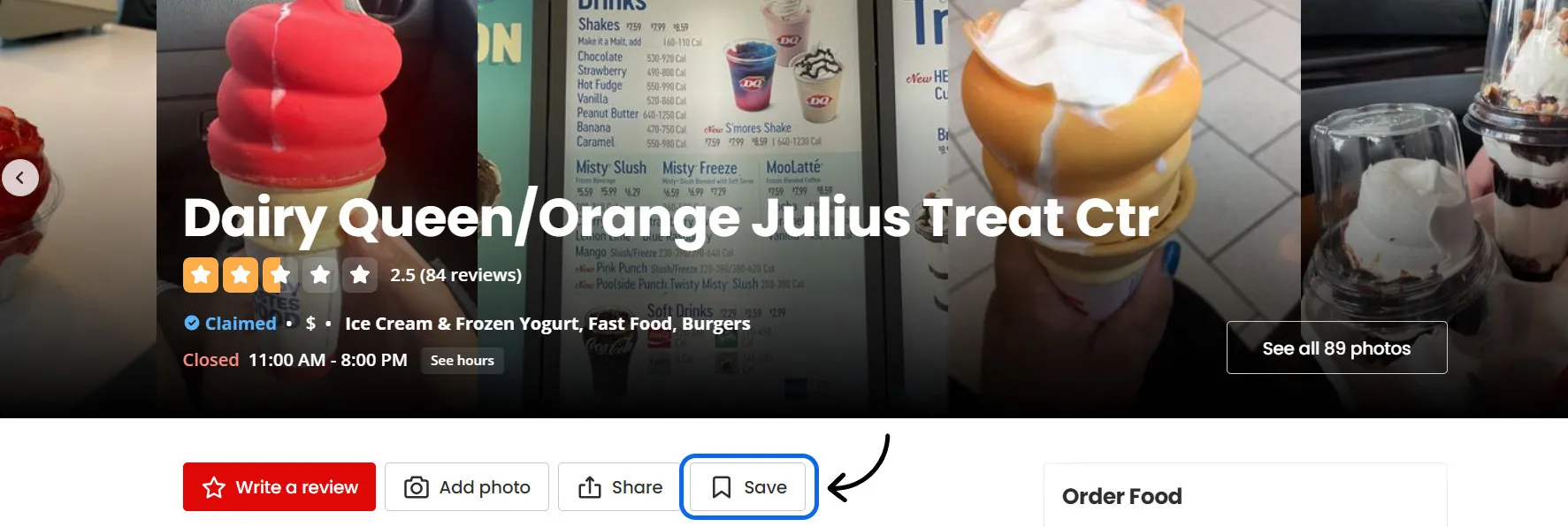
6. Additional Features
Users can try to make reservations or appointments, place online orders, or access other services through Yelp.
For instance, the Yelp business page of Dairy Queen features an “Order Food” button. Users who are satisfied with the reviews and other information shared on the business page, can directly order food by just clicking on this button.
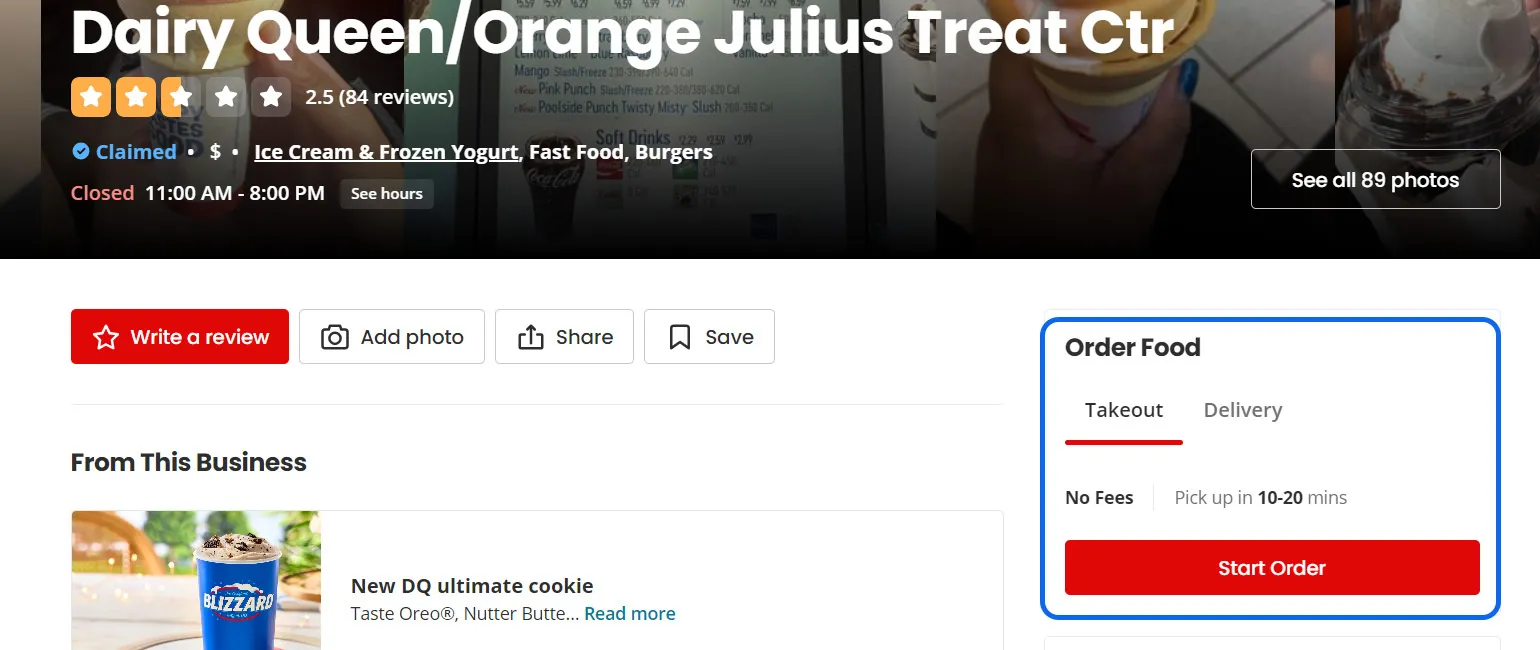
Advantages of The Yelp Review Platform
1. Wide Exposure
A whopping 80 million people visit Yelp each month to search for businesses of all types. Yelp audiences love to browse and leave authentic reviews. But does it make any difference for the businesses? Well, yes! According to a Yelp survey, about 57% of users contact a business they found on Yelp within a day.
Therefore, creating business profiles on Yelp can be very helpful in boosting brand visibility and recognition. By featuring your business on platforms like Yelp, you will open doors to a wider audience, giving your business amazing exposure for engagement and growth.
2. Recommendation Feature
Yelp has an amazing recommendation feature that evaluates reviews based on its quality, reliability, and actions on Yelp. Yelp’s automatic evaluation software looks for the most reliable and useful reviews for regular users.
Yelp ensures that the most trustworthy feedback rises to the top. This builds consumer confidence and enhances the reputation of businesses that consistently deliver excellent service.
3. Ease of Use
One of the reasons users love Yelp is that it is very easy to use. The best part about using Yelp is that users do not need to log in with a username to check for reviews, making access to reviews simpler and more convenient.
As people need not go through the lengthy process of signing up, the ease of use encourages the users to visit Yelp more frequently.
Disadvantages of The Yelp Review Platform
1. Hiding Genuine Reviews
Yelp, as we know, has a review recommendation feature that shows verified reviews more prominently. At the same time, the same system moves certain less reliable reviews to the “Not Recommended” section of the business profile. There is a chance that this may lead to some genuine reviews being hidden (although still accessible) from the user.
2. Getting Negative Reviews Without Getting Listed
What’s surprising is that your business can receive reviews on Yelp even if it is not listed on the platform. Anyone can list your business and start attracting reviews, whether you claim it at the end of the day or not.
Negative reviews on your business profile, which are beyond your control, hold significant power in shaping your online reputation. These negative reviews can harm your image and repel potential customers.
Thus, proactive reputation management strategies, such as providing exceptional customer service, responding to negative comments on social media, optimizing your business profile, and more, are important to managing your online presence and building customer trust.
3. Expensive Enhanced Listing
Another drawback of Yelp is its costly enhanced listings. At $350, they are very expensive, especially for small businesses. Although the enhanced listing profile has some incredible features, such as CTA buttons, slideshows, and more, their higher cost makes them prohibitively expensive for many businesses. This makes Yelp slightly less usable for some businesses.
Understanding Google Reviews
To decide if Google Reviews is suitable for your business, it’s crucial to grasp how it operates and its main pros and cons. Let’s begin by delving into the details of Google Reviews.
What are Google Reviews?
Google Reviews are user-generated reviews and ratings of businesses, locations, or services accessible through Google’s platform. As part of Google Business Profile, they feature prominently in Google Maps and search results, providing valuable insights for potential customers.
Unlike Yelp, Google Reviews are well integrated into Google’s search ecosystem, enhancing a business’s visibility. They give equal weight to all reviews, ensuring a more accurate overall rating. Moreover, many Google Reviews can significantly boost a business’s search ranking, enhancing its online visibility and potential customer reach.
As Google has about 83% of the search engine market share, securing a higher rank on Google search results through positive reviews can immensely benefit a company’s visibility and success.
Below is a reference image of how a Google Business Profile page would look like if you search for ‘Starbucks near you’ on Google. It shows the summary of everything you need to know about the local Starbucks—address, phone number, hours of operation, reviews, and even photos.
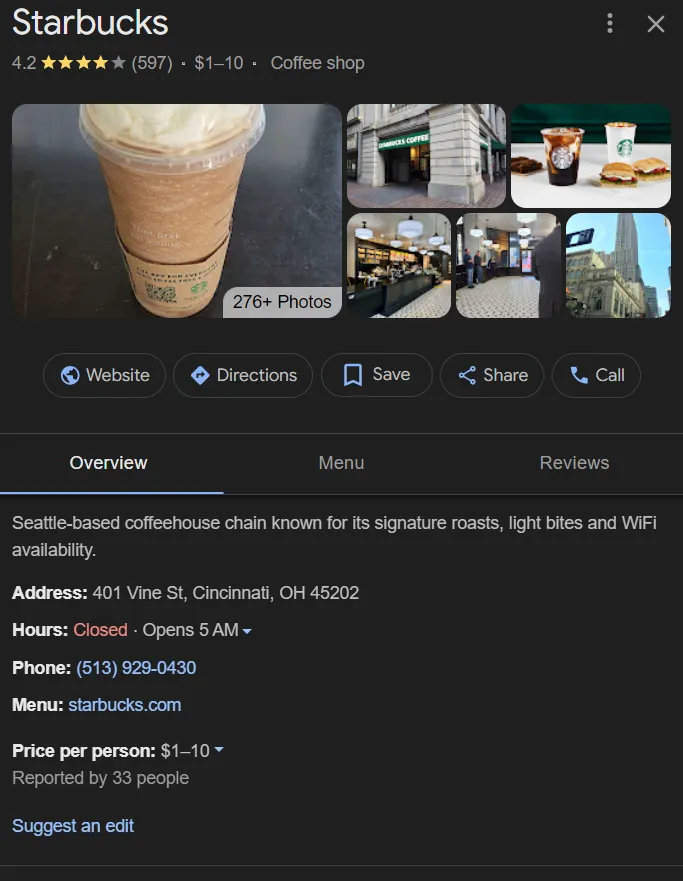
How Does Google Review Work?
Let us see how Google reviews work:
1. Search Functionality
Google’s search function works differently than Yelp. If you want your target audience to be able to search you, you have to start by creating a Google Business Profile and listing your business there or claiming your uncalimed profile. This platform helps you control how your brand and the products appear across Google’s products.
Once you have created a Google Business Profile, your business will be visible on the Google search results page. Moreover, it will also be connected to Google Maps. This will give you an add-on advantage and make it easier for potential customers to find you and zero in on your precise location.
As you can see in the image here, when we searched for ‘pet grooming in Georgetown,’ we got recommendations for different groomers on the Google search engine results page.
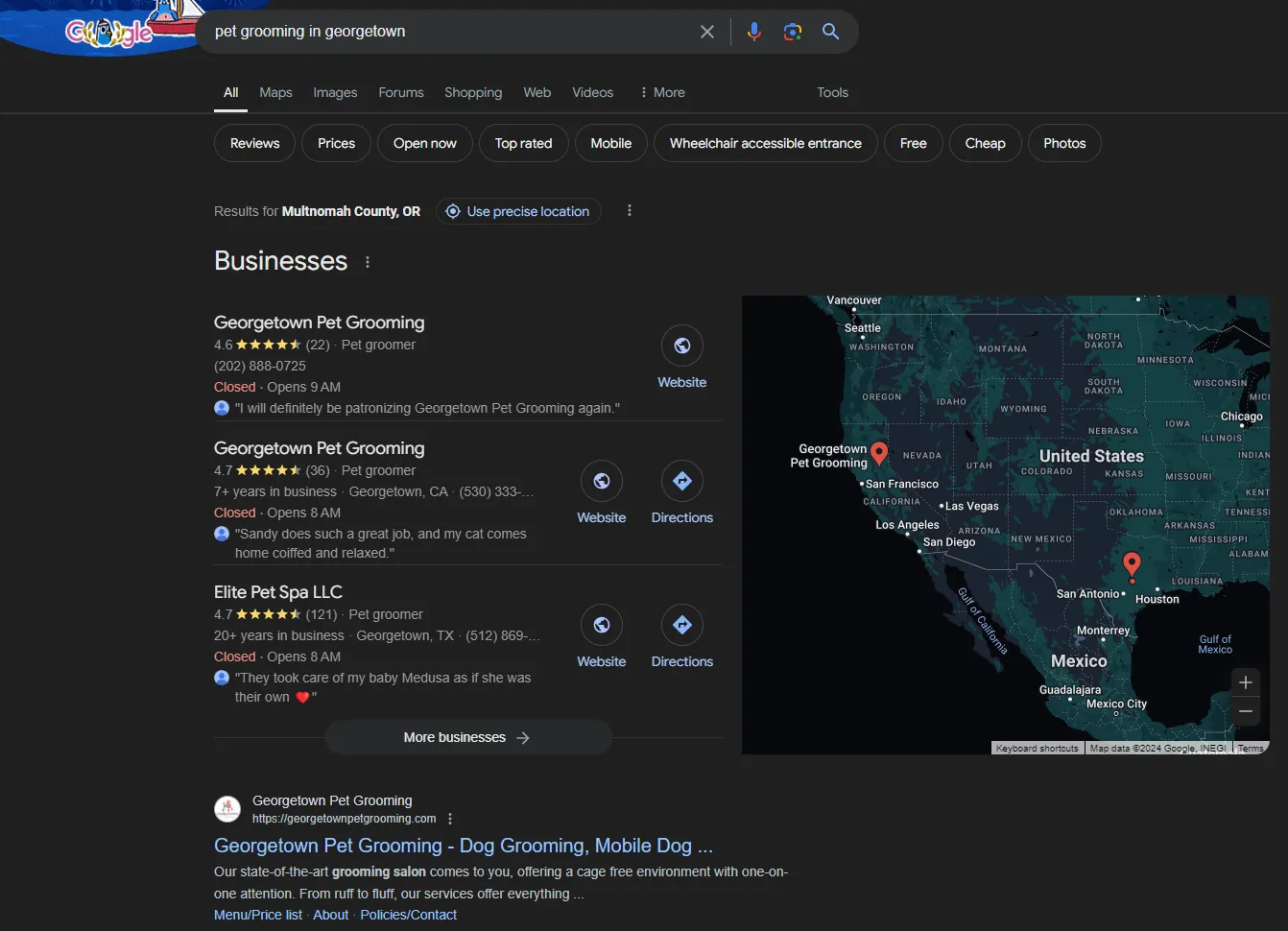
2. Writing Business Review
Once you have set your profile, a customer can write a review for your brand on Google by clicking on the “Write a Review” button right in your business listing.
A reviewer can rate a business on a scale of 1 to 5 stars and can write detailed feedback about their experiences and submit it. They can also add photos to accompany their reviews. For better understanding, take a look at the screenshot below. It shows how Google ratings and reviews section looks like.
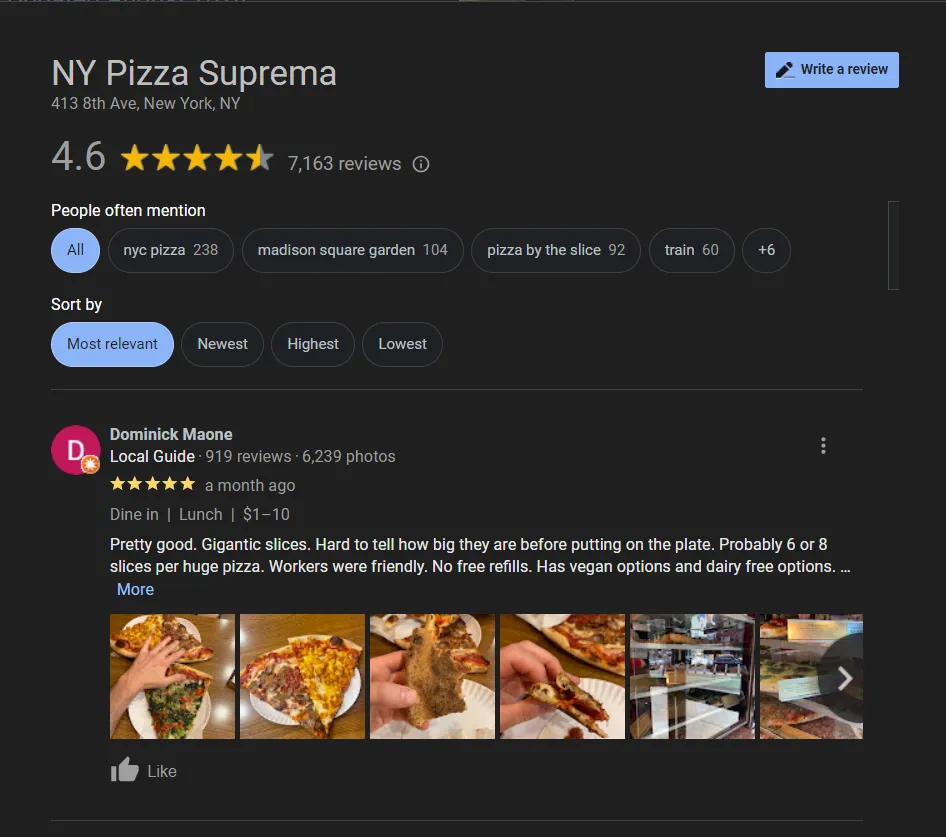
3. Reading Customer Reviews
Your potential customers have an opportunity to search and view your profile, which prominently displays the average star rating and the number of reviews given by your existing users.
Customers looking to learn more about you read through individual reviews to get detailed insights into others’ experiences. They can even sort the reviews by date, rating, or relevance.
4. Responding to Reviews
As business owners, you can respond to reviews directly from your Google Business profile dashboard. Through your responses, you can address positive feedback, resolve issues raised in negative reviews, or provide additional information.
Both review and owner responses are visible to the public, showing the business’s engagement with customers.
5. Questions and Answers
The Question and Answer section in your Google profile supplements the reviews section and allows the customers to ask about your services and get quick responses, which builds trust and engagement.
In our experience, by keeping the section active and informative, you can enhance your online brand reputation and make your business more appealing to potential customers.
Advantages of Google Reviews
1. Boost to Local SEO
Google Review profile is a search engine and review platform in one. By optimizing your Google business profile properly, you can elevate your local SEO rankings, thereby boosting your website traffic.
Also, the reviews help to boost the trust in the business, leading to better click-through rates and higher visibility among potential customers seeking relevant services or products.
2. Higher Volume of Reviews
Given that Google is a platform used by millions of users globally and has an easy review process, businesses have a better chance of getting feedback than on other platforms.
The wide reach of the platform helps to attract more reviews and this growth in the number of feedback enhances your business’s online presence and credibility, making it a preferred choice for organizations.
3. Local Ranking Factor
Google Reviews are a ranking factor that impacts a business’s online reputation. Therefore, getting more positive reviews on your business listing helps you get a higher ranking in local results on Google Maps and Search. This emphasizes the need to use Google Reviews strategically in managing your online reputation.
Disadvantages of Google Reviews
1. Lesser Opportunities for Removing Fake Reviews
Google is continuously working on improving its detection of fraud reviews. However, fake reviews still find their way in.
While you may be willing to remove such reviews immediately, they can not be directly removed from your Google business listing. The only option is to report it to Google and wait for them to review it. Google will remove reviews that violate Google’s policies.
2. Users Can Leave Star Ratings Without Any Comments
Users have the ability to leave star ratings on Google Reviews without writing any comments. This feature allows for quick and straightforward feedback, but it may lack the depth and detail provided by written reviews.
This also potentially limits the authenticity of the review and insights available to understand the businesses and other users.
3. Impact of Negative Reviews
Negative reviews on Google can significantly affect a business’s reputation, as they are clearly displayed alongside search results. Unlike some platforms, there’s no option to hide or filter out certain reviews, making negative feedback more visible to potential customers.
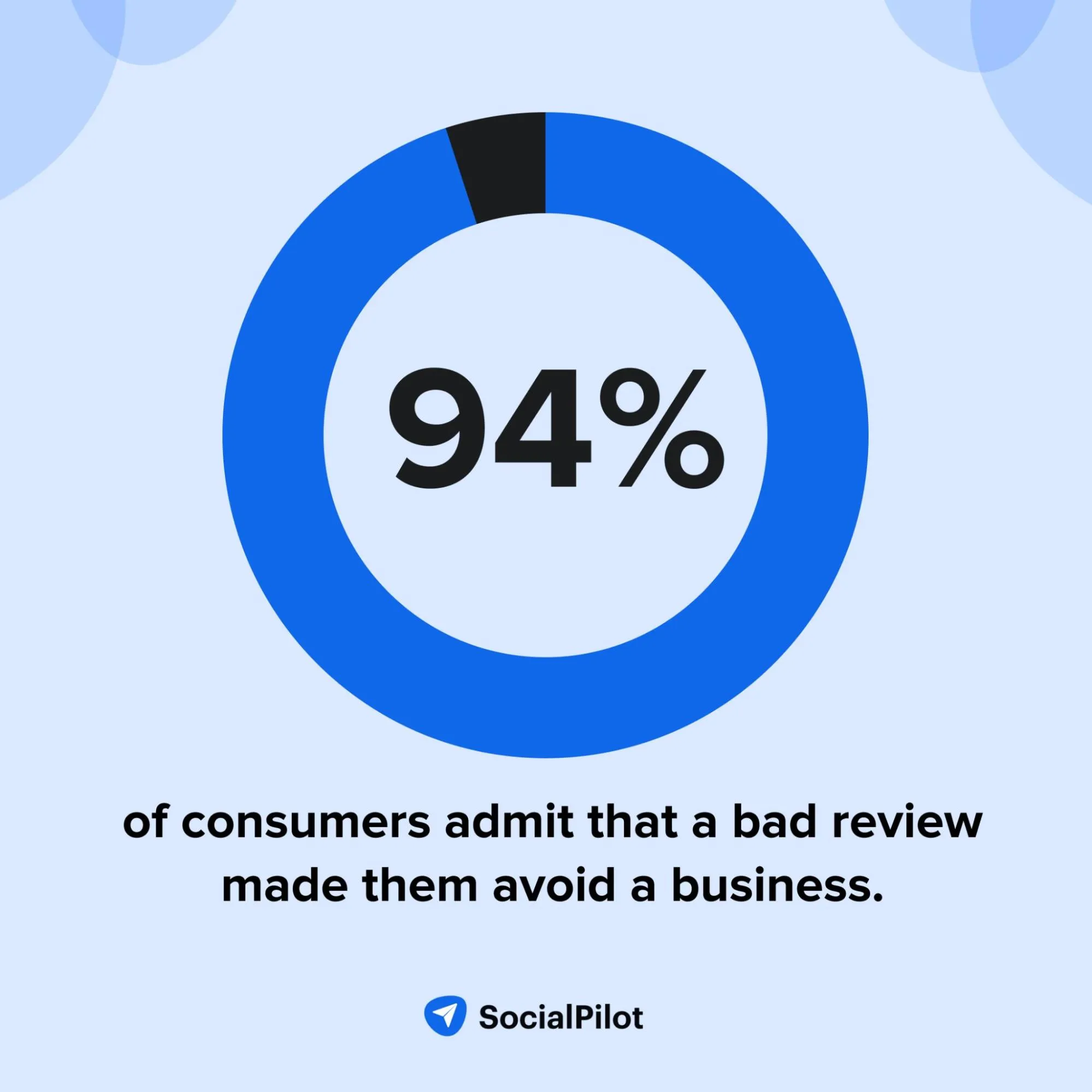
Google vs Yelp Reviews: Factors to Consider While Choosing Between Google Reviews and Yelp
To help you determine which platform, Yelp or Google Reviews, best suits your business needs, we’ve assessed each based on certain factors such as user base, review authenticity, and business visibility.
1. User Base
If your business aims to reach a wider audience, Google should be your number-one choice.
In 2022, Google experienced a significant rise in usage for local business research, with 87% of individuals turning to the platform, up from 81% in 2021. Conversely, Yelp experienced a decline, with only 48% of respondents utilizing it, down from 53% in 2021.
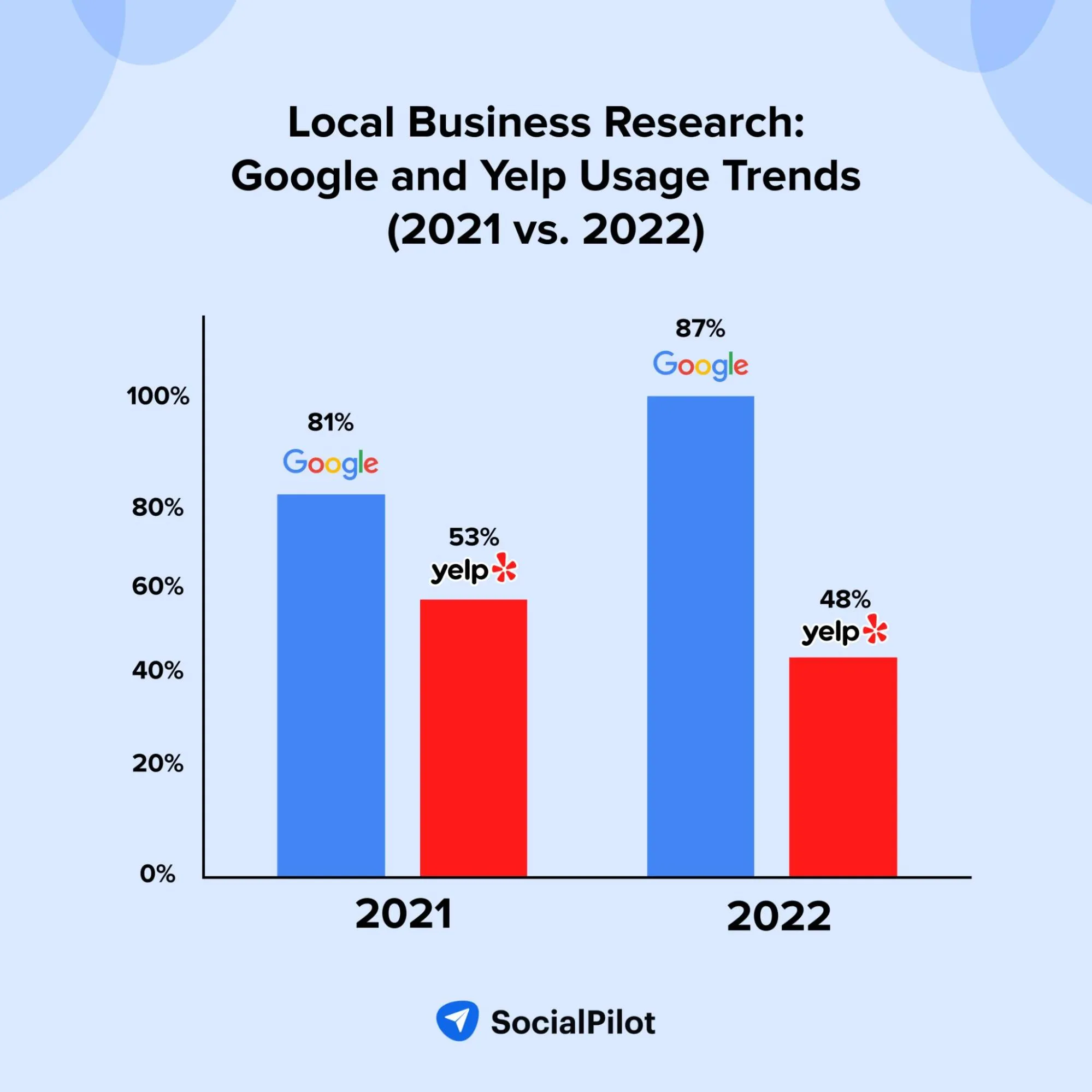
2. Authenticity of Review
Google and Yelp have strict policies to prevent fraudulent reviews. They use systems such as automated detection systems and human analysts to ensure review integrity.
However, Yelp is a platform with more strict and comprehensive measures to control the quality of reviews. The Yelp user operation team investigates any issues reported by business owners, community members, and Yelp’s automated system.
If any abnormalities are found after the investigation, the team can take punitive actions such as a temporary ban from posting reviews, review or listing removal, search ranking penalties, advertising bans for at least a year, and ongoing monitoring for repeat offenses on the user.
This emphasizes Yelp’s level of review authenticity.
3. Community Engagement
Yelp is known for its engaged community, with users posting pictures and feedback for local businesses very regularly. Yelp has done a great job at nurturing a community-driven approach. This has helped to foster an enhanced sense of engagement and trust with the platform.
On the contrary, Google Reviews has a serviceable approach to its platform with comparatively less focus on community interaction. While users leave reviews on Google Reviews as well, the engagement is less than Yelp’s.
4. Reach and Influence
Google Reviews has the upper hand in terms of reach and influence since it has a global reach and many business listings and search results are integrated into it.
Yelp is more dependent on the US market. However, its more consistent user base and engaged communities make it really effective, especially in industries such as restaurants and bars.
How to Manage Yelp and Google Reviews Seamlessly
While you’re eagerly waiting for customer reviews on Google, they might already be sharing their experiences on Yelp. Businesses today face several challenges when managing reviews across multiple platforms:
1. Time Constraints
Manually handling reviews on multiple platforms can be difficult and time-consuming. This is especially true if you have multiple brands and locations to manage.
2. Missed Opportunities for Engagement
A golden key to online business reputation is in responding to both negative and positive reviews. If you frequently fail to respond to consumer reviews, you may miss the bus to address customer concerns, build relationships, and improve brand reputation.
3. Difficulty Tracking Performance
When you monitor customer reviews consistently, you get to learn about the developing trends and what the consumers like and dislike about you. However, managing these reviews can be difficult across multiple platforms, making it difficult to identify trends and areas for improvement.
4. Negative Reviews Impacting Reputation
You can not avoid negative reviews. Therefore it is important to keep an eye on negative and fake reviews. Negative reviews across different review platforms can significantly impact a business’s reputation, especially if they go unanswered or are not handled appropriately.
5. Difficulty in Scaling
As businesses grow, manually managing reviews becomes increasingly difficult, leading to potential bottlenecks and delays in responding to customer feedback.
To overcome these challenges, businesses often turn to review management software such as SocialPilot Reviews to automate tasks, streamline workflows, and improve overall review management efficiency.
SocialPilot Reviews is a centralized review management tool that brings reviews from different platforms, such as Google and Facebook, to one single dashboard. It simplifies your life through multi-location and multi-brand review management.
It helps in collection of reviews through automated email and SMS campaigns personalized to specific customer journeys, maximizing review volume with minimal effort. It collects reviews and questions from all locations in one place, helping you to respond promptly from the dashboard of the tool.
Conclusion
Both Google Reviews and Yelp offer valuable insights and opportunities for businesses to engage with customers and enhance their online reputation. While Google Reviews excels in broader reach and SEO benefits, Yelp stands out for its stringent review authenticity measures and engaged community.
Effectively utilizing both platforms can contribute to enhancing the social customer experience. Businesses should focus on collecting genuine reviews, promptly addressing feedback, and optimizing their profiles for maximum visibility.
Understanding the capabilities of each platform and tailoring strategies accordingly can amplify the impact of customer reviews on business success.
Managing reviews on multiple platforms doesn’t need to be overwhelming. With SocialPilot Reviews, a business review management tool, you can stay ahead of the game and strengthen your online reputation.
Try SocialPilot Reviews today!


